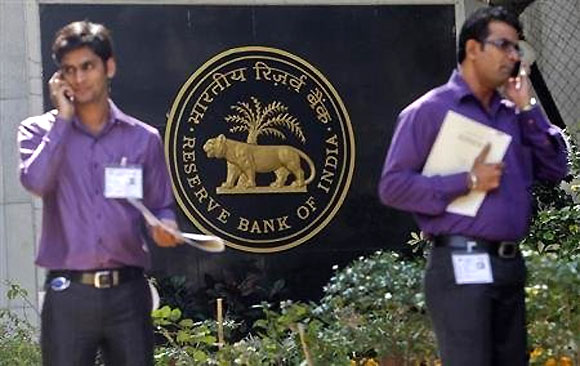 | « Back to article | Print this article |
New banks: Why RBI must be cautious
New banks will mean the RBI must improve oversight.
The aspirants for new banking licences include both those who were widely expected to throw their hats into the ring and those whose names have hardly been on anybody’s radar.
The overall number is smaller than was earlier being speculated on and some names that were widely seen as being extremely eager to enter the business apparently had second thoughts.
The Reserve Bank of India’s (RBI’s) workload may now be a little less than anticipated, but its essential considerations and concerns must remain the same.
Click NEXT to read more…
New banks: Why RBI must be cautious
First, the issuance of licences to corporate houses now seems to be a fait accompli.
When this happens, it will signal the end of a premise that has been at the core of India’s banking evolution over the past 44 years.
In 1969, one significant rationale for bank nationalisation was the perception that private banks were simply not capable of fulfilling a broader social mandate; more so, banks owned by business groups were channelling public deposits somewhat restrictively into group companies.
Forty-four years later, the very same ownership patterns are now expected to achieve financial inclusion objectives that government-owned banks were not able to achieve over these decades!
Click NEXT to read more…
New banks: Why RBI must be cautious
This would be ironic, if it weren’t for the fact that many corporate houses have actually built up relatively large and successful financial businesses through the non-bank financial company (NBFC) route over the past couple of decades.
It would be difficult to deny them entry into banking, while allowing someone who has no comparable experience to set up a bank. But have the concerns about related party transactions gone away?
Certainly not. If corporate entry is inevitable, the only way to allay such concerns is for the RBI to ensure that its supervisory capabilities are up to the task of preventing such practices.
Click NEXT to read more…
New banks: Why RBI must be cautious
The recent revelations about widespread violations of know your customer (KYC) norms by some banks certainly raise some questions about supervisory effectiveness. The RBI must make explicit how it plans to restructure its internal systems and resources to be able to deal with these new challenges.
Second, given that financial inclusion was the most important motivation for the government to open up the sector, the question has to be asked: how are the aspirants expected to achieve this objective? Existing banks, by and large, have made heavy weather of the mandate, suggesting that its commercial viability is weak.
Of course, this does not preclude the existence of a completely different and viable business model.
Click NEXT to read more…
New banks: Why RBI must be cautious
The onus will be on the scrutinising committee to look for innovative proposals to expand financial access among the 26 applications and give significant weight to these in their recommendations.
At the same time, there is no reason why existing government-owned banks cannot be given a greater nudge, along with some flexibility, to use their existing branch networks more productively to increase inclusion.
New banks are not going to be a panacea for financial exclusion, a responsibility that must engage every part of the system. In short, the final choices must reconcile issues of ownership and governance, supervisory capabilities and innovative approaches to inclusion. Not issuing any licences is also a choice.
(Disclosure: Kotak Mahindra and associates are significant shareholders in Business Standard Limited)




